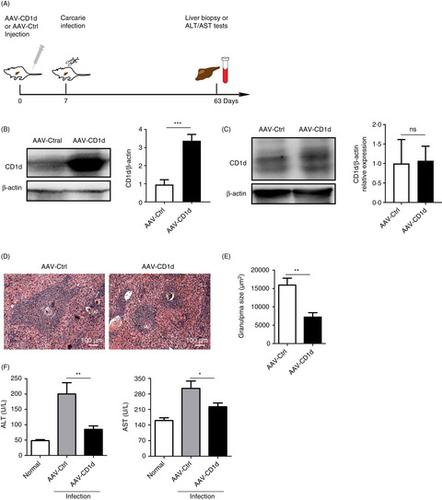当前位置:
X-MOL 学术
›
Immunology
›
论文详情
Our official English website, www.x-mol.net, welcomes your feedback! (Note: you will need to create a separate account there.)
Hepatocyte CD1d protects against liver immunopathology in mice with schistosomiasis japonica
Immunology ( IF 6.4 ) Pub Date : 2020-12-06 , DOI: 10.1111/imm.13288 Zhigang Lei 1 , Rui Tang 1 , Qianqian Qi 1 , Pan Gu 1 , Junling Wang 1 , Lei Xu 1 , Chuan Wei 1 , Yanan Pu 1 , Xin Qi 1 , Ying Chen 1 , Beibei Yu 1 , Yanxiong Yu 1 , Xiaojun Chen 1 , Jifeng Zhu 1 , Yalin Li 1 , Sha Zhou 1 , Chuan Su 1
Immunology ( IF 6.4 ) Pub Date : 2020-12-06 , DOI: 10.1111/imm.13288 Zhigang Lei 1 , Rui Tang 1 , Qianqian Qi 1 , Pan Gu 1 , Junling Wang 1 , Lei Xu 1 , Chuan Wei 1 , Yanan Pu 1 , Xin Qi 1 , Ying Chen 1 , Beibei Yu 1 , Yanxiong Yu 1 , Xiaojun Chen 1 , Jifeng Zhu 1 , Yalin Li 1 , Sha Zhou 1 , Chuan Su 1
Affiliation

|
Schistosomiasis is a neglected tropical disease with over 250 million people infected worldwide. The main clinically important species Schistosoma mansoni (S. mansoni) and Schistosoma japonicum (S. japonicum) cause inflammatory responses against tissue‐trapped eggs, resulting in formation of granulomas mainly in host liver. Persistent granulomatous response results in severe fibrosis in the liver, leading to irreversible impairment of the liver and even death of the host. CD1d, a highly conserved MHC class I‐like molecule, is expressed by both haematopoietic and non‐haematopoietic cells. CD1d on antigen‐presenting cells (APCs) of haematopoietic origin presents pathogen‐derived lipid antigens to natural killer T (NKT) cells, which enables them to rapidly produce large amounts of various cytokines and facilitate CD4+ T helper (Th) cell differentiation upon invading pathogens. Noteworthy, hepatocytes of non‐haematopoietic origin have recently been shown to be involved in maintaining liver NKT cell homeostasis through a CD1d‐dependent manner. However, whether hepatocyte CD1d‐dependent regulation of NKT cell homeostasis also modulates CD4+ Th cell responses and liver immunopathology in murine schistosomiasis remains to be addressed. Here, we show in mice that CD1d expression on hepatocytes was decreased dramatically upon S. japonicum infection, accompanied by increased NKT cells, as well as upregulated Th1 and Th2 responses. Overexpression of CD1d in hepatocytes significantly decreased local NKT numbers and cytokines (IFN‐γ, IL‐4, IL‐13), concomitantly with downregulation of both Th1 and Th2 responses and alleviation in pathological damage in livers of S. japonicum‐infected mice. These findings highlight the potential of hepatocyte CD1d‐targeted therapies for liver immunopathology control in schistosomiasis.
中文翻译:

肝细胞 CD1d 对日本血吸虫病小鼠肝脏免疫病理学的保护作用
血吸虫病是一种被忽视的热带疾病,全世界有超过 2.5 亿人被感染。临床上主要的曼氏血吸虫(S. mansoni)和日本血吸虫(S. japonicum )) 引起对组织捕获的卵子的炎症反应,导致主要在宿主肝脏中形成肉芽肿。持续的肉芽肿反应导致肝脏严重纤维化,导致不可逆的肝脏损伤,甚至导致宿主死亡。CD1d 是一种高度保守的 MHC I 类分子,由造血细胞和非造血细胞表达。造血源抗原呈递细胞 (APC) 上的 CD1d 将病原体来源的脂质抗原呈递给自然杀伤 T (NKT) 细胞,使其能够快速产生大量各种细胞因子并促进 CD4 +入侵病原体后的 T 辅助 (Th) 细胞分化。值得注意的是,最近已证明非造血来源的肝细胞通过 CD1d 依赖性方式参与维持肝脏 NKT 细胞稳态。然而,NKT 细胞稳态的肝细胞 CD1d 依赖性调节是否也调节小鼠血吸虫病中的 CD4 + Th 细胞反应和肝脏免疫病理学仍有待解决。在这里,我们在小鼠中显示,在S. jponicum 上,肝细胞上的 CD1d 表达显着降低感染,伴随着增加的 NKT 细胞,以及上调的 Th1 和 Th2 反应。肝细胞中 CD1d 的过表达显着降低了局部 NKT 数量和细胞因子(IFN-γ、IL-4、IL-13),同时下调了 Th1 和 Th2 反应,并减轻了感染日本血吸虫的小鼠肝脏的病理损伤。这些发现突出了肝细胞 CD1d 靶向疗法在血吸虫病肝脏免疫病理学控制中的潜力。
更新日期:2020-12-06
中文翻译:

肝细胞 CD1d 对日本血吸虫病小鼠肝脏免疫病理学的保护作用
血吸虫病是一种被忽视的热带疾病,全世界有超过 2.5 亿人被感染。临床上主要的曼氏血吸虫(S. mansoni)和日本血吸虫(S. japonicum )) 引起对组织捕获的卵子的炎症反应,导致主要在宿主肝脏中形成肉芽肿。持续的肉芽肿反应导致肝脏严重纤维化,导致不可逆的肝脏损伤,甚至导致宿主死亡。CD1d 是一种高度保守的 MHC I 类分子,由造血细胞和非造血细胞表达。造血源抗原呈递细胞 (APC) 上的 CD1d 将病原体来源的脂质抗原呈递给自然杀伤 T (NKT) 细胞,使其能够快速产生大量各种细胞因子并促进 CD4 +入侵病原体后的 T 辅助 (Th) 细胞分化。值得注意的是,最近已证明非造血来源的肝细胞通过 CD1d 依赖性方式参与维持肝脏 NKT 细胞稳态。然而,NKT 细胞稳态的肝细胞 CD1d 依赖性调节是否也调节小鼠血吸虫病中的 CD4 + Th 细胞反应和肝脏免疫病理学仍有待解决。在这里,我们在小鼠中显示,在S. jponicum 上,肝细胞上的 CD1d 表达显着降低感染,伴随着增加的 NKT 细胞,以及上调的 Th1 和 Th2 反应。肝细胞中 CD1d 的过表达显着降低了局部 NKT 数量和细胞因子(IFN-γ、IL-4、IL-13),同时下调了 Th1 和 Th2 反应,并减轻了感染日本血吸虫的小鼠肝脏的病理损伤。这些发现突出了肝细胞 CD1d 靶向疗法在血吸虫病肝脏免疫病理学控制中的潜力。


























 京公网安备 11010802027423号
京公网安备 11010802027423号